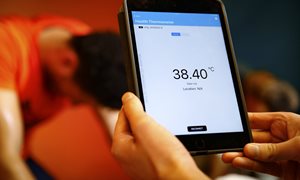
Exercise lowers the risk of glucose intolerance, obesity, elevated cholesterol and hypertension. Also in patients with existing cardiovascular diseases, the risk of new cardiovascular diseases can be lowered by an individual exercise guideline, argues epidemiologist Esmée Bakker in her dissertation, on which she obtained her PhD on March 4 from Radboudumc and Liverpool John Moores University.
Patients with heart failure or other cardiovascular diseases are generally less active than healthy people or people who belong to a risk group because of high cholesterol, diabetes or hypertension. Esmée Bakker's research shows that heart patients sit for an average of over ten hours in a day, while healthy people generally sit for nine hours. This much sitting causes health to deteriorate and the risk of death to increase.
Strength training twice a week
To reduce the risks of cardiovascular disease, both cardiovascular patients and people without symptoms are advised to do strength training at least twice a week. Subjects who actually did this were found to reduce the risk of metabolic syndrome (combination of glucose intolerance, obesity, elevated cholesterol and hypertension) by almost twenty percent. They also looked at how much strength training lowers this risk. And what did it show? If you do less than an hour of strength training in total per week, the risk of cardiovascular disease decreases by almost thirty percent. So adding strength training to your weekly routine really does make a difference!
The fitter, the lower the risk of heart disease
Esmée Bakker also studied the influence of cardiac rehabilitation on the prognosis of patients. Patients suffering from heart failure are often less fit than healthy persons. How fit a patient is partly determines the risk of more heart disease. To lower this risk, patients can follow a cardiac rehabilitation program to get them to exercise more. This study found that patients who do not improve their physical fitness in rehabilitation have almost a two times higher risk of unexpected hospitalization or death. Almost half of heart failure patients show no improvement in fitness. Thus, especially for patients with heart failure, it is crucial to make an individual guideline so that they become more active and the further risks decrease.
Different effects of increased exercise
Esmée Bakker: "Actually, everyone, regardless of age, benefits from more exercise. In both healthy test subjects and patients we see that they benefit most from the effects when they go from not moving to moving a little. So the risks decrease fastest in both groups especially at the beginning of the exercise program. The difference is in the long term. In cardiovascular patients the effects last longer if they continue to exercise, this is not the case in healthy individuals. Healthy individuals reach a plateau at some point. So, especially in patients, it appears the more exercise the better."
The coronavirus makes us move even less
Although the research itself was not conducted in 'corona time', it is clear that the corona virus has major consequences for our health. Bakker: "Healthy people sat for nine hours before corona. Nowadays this quickly becomes more because of working at home. By getting up for a few minutes every half hour, you can already make a difference. Regardless of your age or risk, even a little exercise helps."
About the PhD
Thesis title: Physical Activity and Sedentary Behaviour in the Prevention of Cardiovascular Disease. Promoters: Prof. Dr. D.H.J. Thijssen (Liverpool John Moores University, United Kingdom), Prof. Dr. M.T.E. Hopman and co-supervisors Dr. T.M.H Eijsvogels and Dr. P. M. Watson (Liverpool John Moores University, United Kingdom). Esmée Bakker will receive her PhD on March 4 at 10.30 am at Radboudumc/ Radboud University. Her PhD can be followed live here. Link https://www.radboudumc.nl/agenda/2021/maart/04mar2021-promotie-esmee-bakker
Related news items

Grants for heart and kidney research Two awards to Radboudumc in Open Competition ENW-XS
21 July 2022Two researchers from the Radboudumc receive a grant from the NWO within the Open Competition of the Exact and Natural Sciences. They are Thijs Eijsvogels, who studies the heart, and Pieter Leermakers, who studies the kidneys.
go to page
Your heart rate as a thermometer Research Olympic athletes will be followed up during 4Daagse
18 July 2022Body temperature can be determined from heart rate. This is what research by the Radboudumc among Olympic athletes shows. Athletes can use this method during training to eventually perform better in the heat. The technique is now being further investigated among participants in the 4Daagse.
go to page
Young Investigator Award for Esmée Bakker
14 April 2022 Esmée Bakker received the Young Investigator Award for her abstract ‘Acute and long-term mortality rates among participants of mass-participation sports events versus the general population.’ go to page
Esmée Bakker obtained a Marie Skłodowska-Curie grant
29 March 2022 Esmée Bakker obtained a Marie Skłodowska-Curie European Postdoctoral Fellowships (160k) of the Horizon 2020 of the European Union. go to page
Exercise program appears to be a good alternative to surgery for chronic chest pain Reduced risk of other conditions, hospitalizations, and mortality
9 December 2021 Patients with chronic chest pain may benefit more from following an exercise program than from surgery in which doctors place a stent. Data from over 18,000 patients show a reduced risk of mortality, hospitalizations and other conditions. go to page
